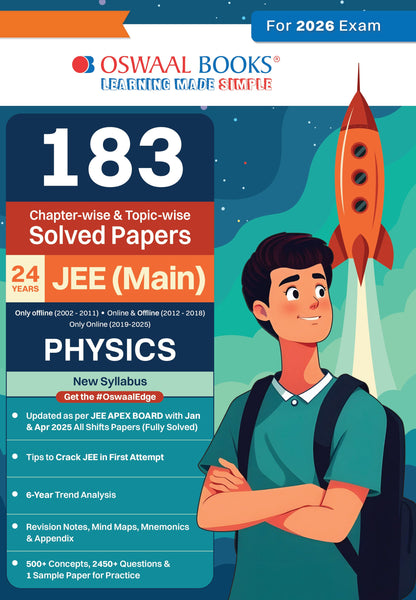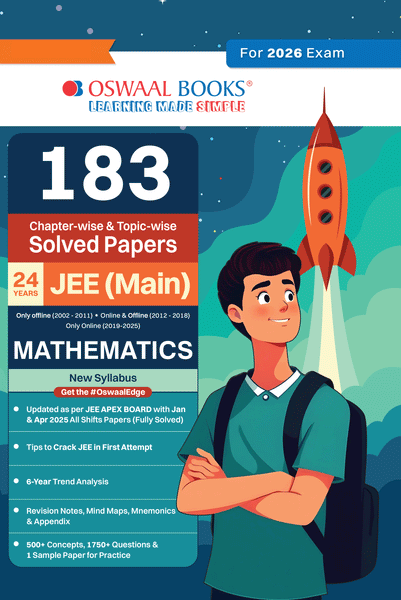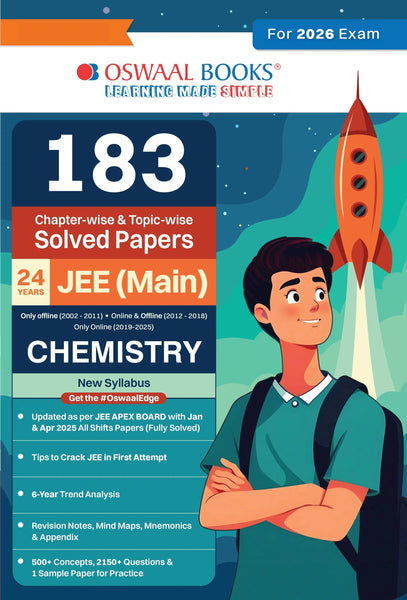Exams
Type of Books
Subject
Quick Links
JEE Main Previous Year Question Papers (PYQ)

183 Chapter-wise & Topic-wise Solved Papers JEE (Main) | Online (2012-2025) & Offline (2002-2018) | Physics Book | For 2026 Exams

183 Chapter-wise & Topic-wise Solved Papers JEE (Main) | Online (2012-2025) & Offline (2002-2018) | Mathematics Book | For 2026 Exams

183 Chapter-wise & Topic-wise Solved Papers JEE (Main) | Online (2012-2025) & Offline (2002-2018) | Chemistry Book | For 2026 Exams
|
Maths |
|
|
Physics |
|
|
Chemistry |
Other Recommended Books | Study Materials
|
JEE Main Books | For 2026 Exams |
|
|
JEE Main Mock Test Sample Papers | For 2026 Exams |
|
|
JEE Main Previous Year Question Papers | For 2026 Exams |
|
|
JEE Main Syllabus | For 2026 Exams |
|
|
JEE Main Notes | For 2026 Exams |
|
|
JEE Main RMT Flashcards | For Latest Exams |
|
|
JEE Main Handbooks | For Latest Exams |
|
|
Free JEE Main Specimen Sample Books for Teachers |
Practice Comprehensively with Oswaal360 Online Courses for JEE Main 2026 Exams
Practice Now with Free Oswaal360 Online Mock Test for JEE Main 2026 Exams
Are You a Teacher? Apply for FREE JEE Main Specimen Sample Books For Teachers from our end.
JEE Main with Previous Year Question Papers (PYQ)
Preparation for JEE Main exam requires strategic planning and good study materials.There are several students who aspire to study in best engineering colleges such as NITs and IIITs but they are misguided. They understand which topics appear more often. This makes study time more useful and focused.
Chapter-Wise Learning Makes It Easy
The JEE Main previous year question paper book follows a simple method. You study one chapter at a time. After learning a topic from your textbook, you can quickly practice questions from that same chapter. This helps you remember better.
When you finish one chapter and move to the next, you feel progress. You don't get confused by mixing different topics together. Each chapter has questions from many years, so you understand the topic deeply.
Important Features of These Books
Complete Coverage of All Topics
These books cover Physics, Chemistry, and Mathematics completely. Every important chapter is included. No topic is left out. You get questions from online exams (2012-2025) and offline exams (2002-2018).
Step-by-Step Solutions
Each question comes with a clear solution. The steps are written in simple language. You don't need a teacher to understand the answers. Even difficult questions are explained in an easy way.
Chapter Trends and Patterns Within Topics
The books highlight which questions are asked more often. You can identify patterns in the repetition or modification of questions. This will help you concentrate on the important things first.
Mind Maps for Quick Revision
Visual aids such as mind maps have been provided. They assist in a quick recall of important points. Before exams, you can just take a glance at these maps and they will help you remember everything quickly.
What You Get in This Collection
|
Book Type |
What It Contains |
Best For |
|
Chapter-wise Books |
Questions sorted by chapters |
Topic-wise practice |
|
Complete Sets |
All three subjects together |
Full preparation |
|
Subject Books |
Single subject focus |
Strengthening one subject |
|
Combo Packs |
Books + Flashcards |
Quick revision tools |
Subject-Wise Benefits
Physics
Physics questions need strong concept understanding. The JEE Main pyq book for Physics helps you practice numerical problems. You learn how formulas are used in different ways.
Chemistry
Chemistry is composed of three branches, Physical, Organic and Inorganic. These books organize questions according to these sections. You can practice each type separately. This makes learning systematic and clear.
Mathematics
Mathematics requires a lot of practice. You get more skilled with the subject as you do more problems. These books contain hundreds of questions per chapter.
How to Use These Books Effectively
Create a Study Schedule
Make a simple timetable. Decide which chapters you will cover each week. Allocate more time for difficult subjects. Follow your schedule without missing a day.
Practice Daily
Answering 15-20 questions daily is more effective than solving 100 questions once in a week. Regular practice makes a habit. Your brain remembers better with regular practice.
Mark Important Questions
When you solve a question wrong, mark it. Come back to these questions after a week. Try solving them again. This helps you learn from mistakes.
Time Yourself
Use a timer while practicing. This trains you for the actual exam where time is limited. You learn to solve questions faster without rushing.
Take Mock Tests
After finishing several chapters, take a full test. This shows how much you have learned. It also tells you which areas need more work.
Benefits of Chapter-Wise Practice
Using JEE Main chapterwise pyqs gives you special advantages:
-
You understand one topic completely before moving ahead
-
Confidence builds chapter by chapter
-
Difficult topics get more focused attention
-
You can track progress easily
-
Revision becomes simple and organized
Common Mistakes to Avoid
Using Too Many Books
Some students buy many different books. This creates confusion. One book good enough with full coverage for each subject is enough. Concentrate on quality rather than quantity.
Omitting Revision
While it is important to learn new things, it is just as important to revise. Reserve some time each week for reviewing old chapters. This helps keep the knowledge fresh.
Neglecting Weak Areas
Don't skip the subjects that you don't like. These are the places where you can really get better. Put extra time in your weak subjects.
Not Practicing Under Time Limits
Always practice with a timer. The exam has strict time limits. You must learn to work within that time.
Additional Resources in the Collection
Flashcards for Quick Learning
Some combo packs include flashcards. These are small cards with important formulas, concepts, and tricks. You can carry them anywhere. They help in quick revision before exams.
Trend Analysis Tools
Books show you which topics appeared most in past exams. You can see year-wise trends. This helps you predict important topics for your exam.
Exam-Ready Tips
Special sections provide exam tips. You learn how to attempt papers strategically. Time management techniques are explained clearly.
Why Students Choose These Books
|
Reason |
How It Helps |
|
Clear Language |
Easy to understand even without help |
|
Updated Content |
Latest exam patterns included |
|
Affordable Prices |
Good books at reasonable cost |
|
Complete Package |
Everything needed in one place |
|
Trusted Brand |
Used by thousands of successful students |
From Basic to Advanced
These books suit all types of students:
-
Beginners: Start with easier questions and build confidence
-
Average Students: Get systematic practice to improve scores
-
Advanced Students: Challenge yourself with tough questions
Final Preparation Strategy
As exam dates come closer:
-
Increase mock test frequency
-
Focus more on revision than new learning
-
Practice previous year's full papers
-
Keep stress levels low
-
Maintain regular study hours
Making Smart Choices
Selecting the right study material saves time and reduces stress. These books are designed to make preparation simple. They follow the actual exam pattern. Questions are selected carefully to give maximum benefit.
When you have the right book, preparation becomes easier. You know exactly what to study. There is no confusion about which topics are important. Everything is organized logically.
Final Thoughts
For the JEE Main preparation becomes easy if you have proper resources. These JEE Main chapterwise previous year question book provide you real exam experience. Practice chapter-wise to get in systematic studies. Clear solutions solve doubts faster.
Select those books that make your preparation simpler and not tougher. Emphasize on learning of concepts through practice. Be consistent with your studies. When you combine dedication and the right material, success is inevitable.
Start preparing from today with these books. Practice religiously, revise regularly and keep your confidence. Your dream of making it to a top engineering college is not far-fetched with right guidance and hard work.






